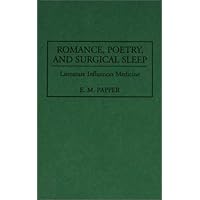
Average Reviews:

(More customer reviews)Papper's thesis is simple and convincing: the ideas of romantic subjectivism were necessary in order for the alleviation of pain to become a medical concern. He traces the emerging importance of the individual and subjective emotion through Romantic Literature of the late 18th and early 19th century.
Click Here to see more reviews about: Romance, Poetry, and Surgical Sleep: Literature Influences Medicine (Contributions in Medical Studies)
Pain and suffering, once associated with punishment for sin, became regarded as a purposeless evil that was hostile to human welfare. The works of Thomas Beddoes, Coleridge, and Shelley embody the change in attitude toward suffering and lay the groundwork for the general use of anesthesia in modern medicine. Papper contends that there was no real societal readiness to treat or prevent pain until the idea of the worth of the common man or woman was established by the upheaval of the French Revolution. The humanitarian concepts that we take for granted were relatively recent developments in Western society and were associated with the recognition of the importance of the individual.

No comments:
Post a Comment